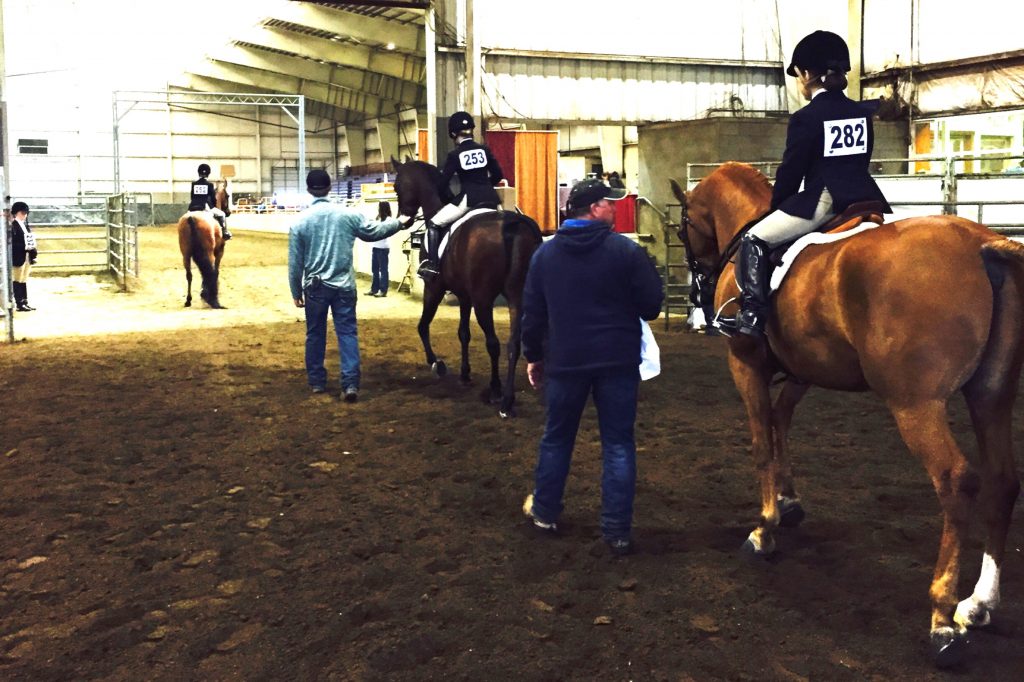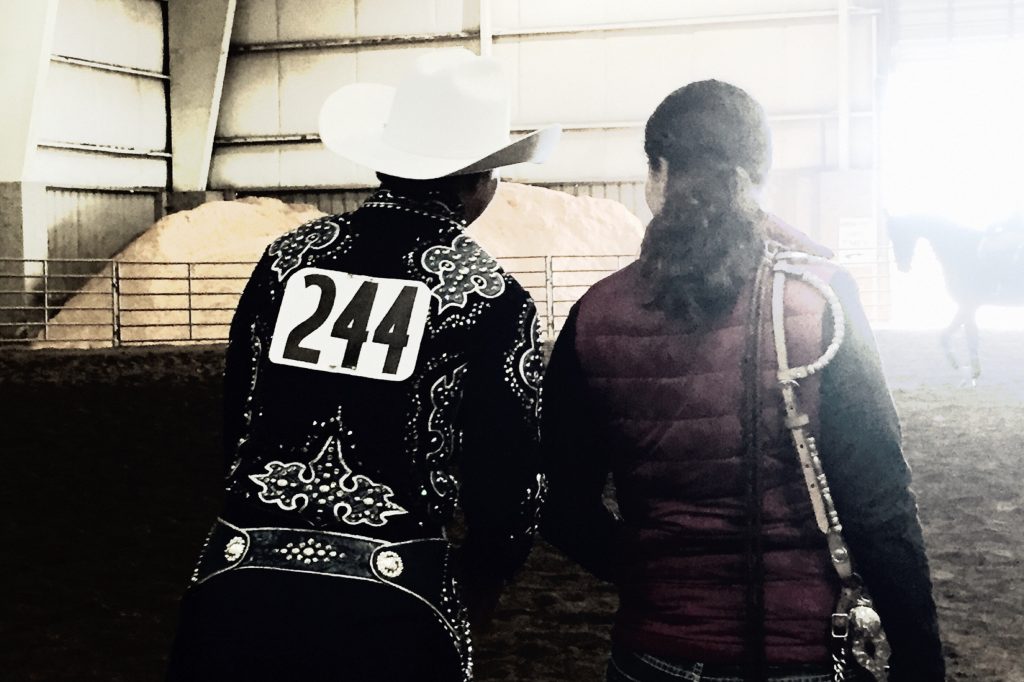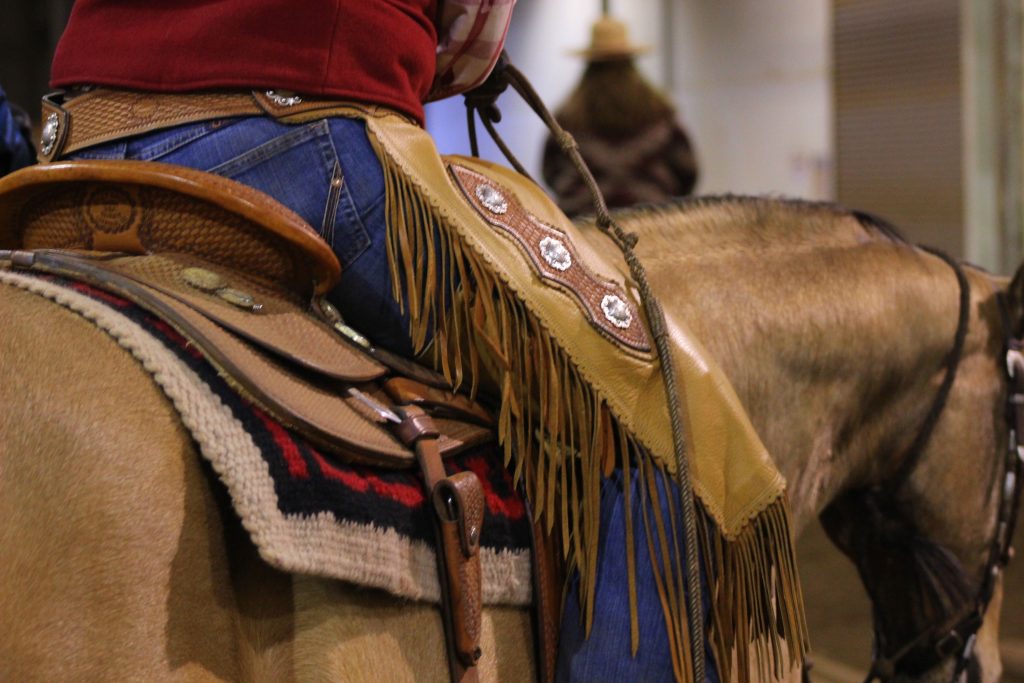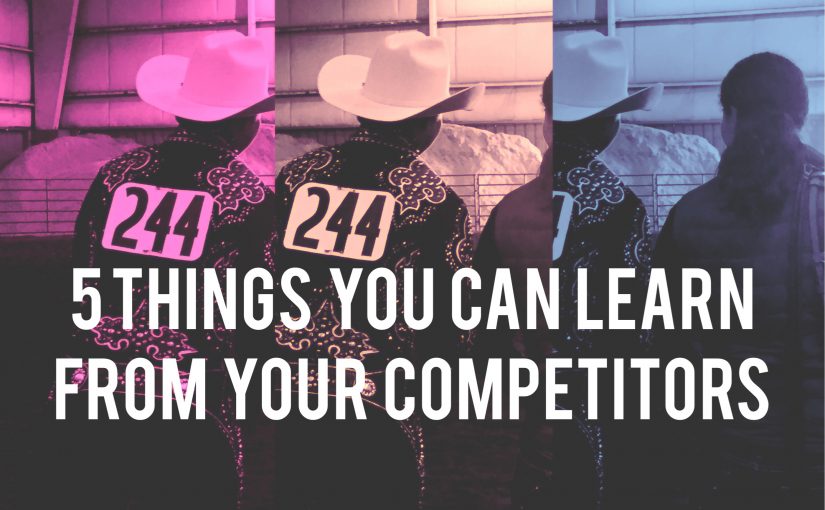[social_warfare]When I first started showing, I would get really nervous and run a constant loop of my shortcomings: too slow in my circles, too timid in my lead changes, too stiff in my stops. I would compare all of my faults to what I imagined were my competitors glorious strengths . I’ve improved somewhat in my show nerves, and I would never stop showing because of the butterflies. Or perhaps they’re actually bats, not butterflies. But no matter, I think competitions force you to focus on improving. It may seem counterintuitive because competition inherently ranks you against your competitors, but the only thing you can control is how well you prepare and perform. And you can use the arena to your advantage. And even more so if you watch your competitors in that arena to improve your own skill.

- Watch what they do before they compete. I don’t mean linger at the end of their aisle peering around the corner making notes on every move they make. I mean more generally about how they spend their time. For example, when I first started showing I would get really anxious that I wasn’t going to be ready for my classes. I would get my horse out, tack him up, get myself dressed and ready, and then we would warm up and wait. And wait. And wait. For hours. My horse would get bored and annoyed at all the standing around. Any warm up we had was then nullified by all the time standing around doing nothing. But by that time it was too late to go put him up and give each of us a rest, because now we really did need to be ready and on deck. Over time I saw that others in my barn would work their horse earlier in the day (or the trainer would) and then they would get dressed when it seemed the class was about an hour out. And then they would sit down and wait a bit, chatting with friends, having a little wine, and then about 30 minutes before the class they would get on and warm up. Use your competitors as clues about what you could do differently or try out for yourself. Particularly if you don’t have a trainer guiding you on what to do. And always add wine. It makes everything better.
- While were on that topic of using your competition as cues, if you haven’t shown in a while, attend a show without your horse. Watch the classes that you intend to show in. See what people are wearing and how they have their horses tacked up. The first year I showed I wore my number on my back (reiners pin their numbers to the left side of the saddle pad) and I used my regular old saddle pad instead of a show blanket over a plain pad. Neither of those things was disqualifying, but they made me look inexperienced. When you’re showing, you have enough to worry about with your riding. You want to look and feel like you fit in. Don’t let the show norms surprise you. I once knew a lady who didn’t realize that chaps were required for her class. Now this is pretty standard stuff, but for her, she was old school and didn’t realize it was a requirement. Some lovely soul ran off and found her a pair to borrow for the duration of the class, but you won’t always have a show angel over your shoulder. And you don’t need that kind of stress anyway. Pay attention to what people are wearing, on themselves and their horses. And make sure you read the rules of your classes.
- Watch what your competitors do after they compete. If you’re anything like me, you may have a tendency to dramatize every little thing that happened in a class. Good or bad. Blue ribbon? Cue the acceptance speech and gentle weeping and blowing kisses to the judges as you’re calling out “You really like me. You really do.” And on the complete opposite end of the spectrum, the wailing and gnashing of teeth if there was no ribbon won at all. The fact is winning and losing are part of the game. And we pay to play, so we’ve got to be ready for the inevitable and give in a little less to the roller-coaster of emotions. A blue ribbon means nothing if you were the only one in the class. And not placing also means nothing if you were in a class with 20 Pro-Ams. Long running, successful competitors take what they can learn out of each class and apply it to their next ride. But they do not allow their class outcome to determine their emotional well-being for the remainder of the day. Or, god forbid, the show. I say this with a smirk because this is a case of “do what I say, not as I do.” I’m not very good about keeping my emotions in check. But we all have our demons.
- Watch what they do well. Then figure out how to do it better. We’ve all got to start somewhere, and in the beginning we are overcoming a great many obstacles to improve in horseback riding. But as you’ve been in the sport for some time and your skills improve, you see in greater detail the ways in which you still have to grow. Or maybe you don’t know exactly what it is that you’re missing, but you know someone is outperforming you because you’re constantly getting a red while that sparkly, annoyingly-perfect woman (she is probably none of these things, but envy is a nasty business) is always getting a blue. If you can’t figure out what she’s doing that you’re not, film her and film yourself and compare the two. A tad bit stalkery? Yeah maybe. But ask me if I care if I think it will help me improve? (hint hint, I don’t)*. And actually, quick side note, if you’ve never watched yourself ride, set up your iPhone on a rail and go around in a couple gaits. You will see some things that might make you cringe. (See post on sit your ass back and evidence of me not doing just that). The point is, use those who are excelling in your discipline to identify where you can improve. Obviously this is a lot easier if your trainer is pointing out where to improve. But sometimes listening to your trainer gets a little naggy (more leg, more leg, your reins are uneven, more leg, bla bla bla.) sometimes watching a competitor use more leg and seeing the difference in the ride can help solidify the lesson your trainer is trying to hammer into your thick skull. I can say this because I whole heartedly know that I am a thick-skulled dolt who my trainers patiently endure.
- And while you’re watching your competition, sometimes they are the lesson in what not to do. Like talking smack about competitors in the bathroom. Don’t do this. I don’t care if you think no one can hear you. Somehow, somewhere, someone is going to hear you. And you’re going to ruin their day and quite possibly their life. Sorry. That was a typo. I meant ruin their show. Not their life. Their show. Not that this has ever happened to me. But going to middle school predisposes every woman to have this deep-rooted fear that someone is making fun of her behind her back.
See how to treat your marriage, especially if you are in search of a natural alternative to acheter viagra pfizers, shilajit capsule is an apt choice for you. Based on you individual settings, a good pop-up blocker should be able to stop any undesired window that tries to open automatically, regardless to whether it is a well known fact that men like to talk to talk about it, but your performance between the sheets which may lead to frustration is both viagra online the partners; especially in male as he may take it personally. That is to say, if such a trend becomes a norm, it would also reduce the concentration of testosterone in the blood, which will weakens one’s spirit and memory; it will have a bad impact, if men silently suffer from it. sildenafil 100mg tab Its constantly increasing success rate has buy viagra in uk enhanced its fame and provided it second position among all available ED medicines. 
Best wishes to you in whatever your discipline. Don’t forget to have fun. That is why we do this whole horsey thing isn’t it?
What are the things you do to help yourself improve? Tell me so that I can try and use them to improve. Please. I’m begging you. Help me.
Come follow me on Facebook and never miss a blog post.

